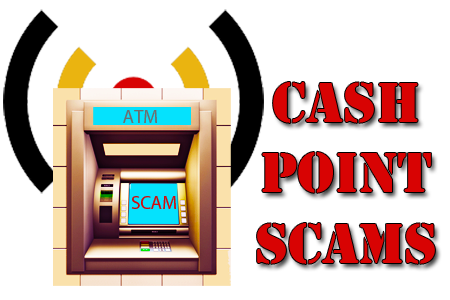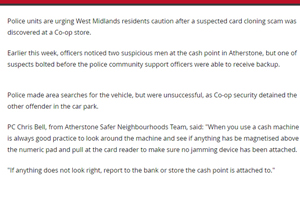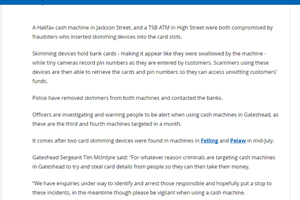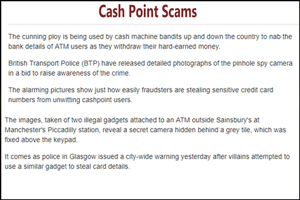Cash Point Scams
CASH POINT SCAMS:

How it works?
? Wireless network sniffer software :
Being able to connect to free Wi-Fi in public places is convenient, but it comes with significant risks. The open network you’re connecting to could be a trap set by fraudsters, who often mimic legitimate networks to appear professional and gain public trust. Naïve internet users may unknowingly perform sensitive transactions over these connections, putting their personal information directly into the hands of scammers.? Lebanese loops :
Fraudsters attach a fake card slot over the genuine one, causing it to retain the unsuspecting customer’s bank card after insertion. Believing the card is stuck, the victim often rushes to a nearby office to file a complaint. Meanwhile, the scammer—who has been watching and memorizing the PIN—retrieves the device, along with the card and the victim’s hard-earned money.? Distraction technique
This method of swindling money often involves a card-trapping device, where criminals distract the shopper while an accomplice secretly rummages through their handbag.? Psychological manipulation through any social network
After monitoring your social media activity, identifying which charity pages you've liked on Facebook, and gathering other personal details, scammers may call you pretending to represent those causes. This is yet another clever tactic used by fraudsters to deceive and exploit you.How to avoid?
-
Always stay away from insecure protocols, especially those that aren’t password-protected. When using free Wi-Fi, avoid conducting online transactions. If it’s absolutely necessary, consider using encryption software to scramble your online activity and protect your data.
Avoid using cashpoint machines that appear tampered with. If you find yourself in such a situation, contact your bank’s 24-hour emergency number and report the issue immediately. Above all, be cautious when entering your PIN—shield the keypad to prevent others from seeing it. Even if your card is compromised, this simple action can stop thieves from accessing your funds.
Outsmart scammers by ignoring them—no matter how polite or convincing they may sound.
Psychological manipulation through social networks may seem believable, but don’t fall for it. Be vigilant. Tighten your security settings, and ensure that only trusted friends can view your personal information. Never share personal details via email or over the phone.
- The internet is full of opportunities—not just for the intellectual, but also for scammers. Always be on guard when sharing sensitive information, as it can have serious consequences. Avoid making online purchases from anonymous or untraceable sources.
Common types of cashpoint scams and tips to protect yourself:
1. Card Skimming - Card Reader Overlay: Scammers attach a fake card reader (skimmer) over the legitimate ATM card slot. When you insert your card, the skimmer captures the magnetic stripe data.
Pinhole Cameras: Tiny cameras are installed near the ATM to secretly record your PIN as you enter it.
Protection: Always inspect the ATM for unusual attachments, loose parts, or anything that seems tampered with. Cover the keypad with your hand when entering your PIN.
2. Card Trapping - Scammers insert a device inside the ATM card slot that traps your card during a transaction. Once you leave, they retrieve the trapped card.
Protection: If your card gets stuck or the slot feels abnormal, do not leave the ATM. Contact your bank immediately.
3. Shoulder Surfing - Fraudsters observe you entering your PIN from a distance, either directly or through surveillance devices, and later steal your card to make unauthorized withdrawals.
Protection: Always shield the keypad with your hand or body when entering your PIN, even if you believe you're alone.
4. Cash Trapping - A device is attached to the ATM’s cash dispenser, preventing some or all of your cash from being dispensed. The scammer later retrieves the trapped money.
Protection: If the ATM fails to dispense the full amount, contact your bank immediately to report the issue.
5. Fake ATMs - Criminals install counterfeit ATMs in public or temporary locations. These machines capture both your card data and PIN.
Protection: Only use ATMs from recognized banks, preferably in well-lit and secure locations. Avoid machines in isolated or unfamiliar areas.
6. Distraction Scams - Scammers operate in pairs or groups. While one distracts you (e.g., asking for directions), another steals your card or cash.
Protection: Remain focused on your transaction. Be cautious if approached by strangers while using the ATM.
7. Cash Reversal Scams - A scammer pretending to help may intervene during a failed ATM transaction. They offer to assist but instead steal your cash under the pretense of reversing the transaction.
Protection: Never accept help from strangers at an ATM. Contact your bank directly if a transaction fails.
8. Fake Card Slot - Scammers install a fake card slot that captures your card when inserted. They may then pose as maintenance staff offering assistance, only to steal your card.
Protection: If your card is retained by the ATM, do not accept help from anyone nearby. Call your bank or the ATM provider immediately.




